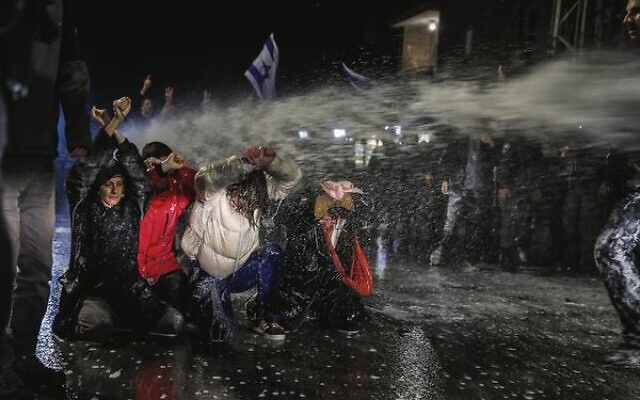A path that unifies, rather than divides
Beyond the security chiefs' concerns, the impact on Israel's civil society is of great concern. Israel's democracy is fragile.

Mark Friedgut (AJN 23/03) helpfully highlights the incredibly broad base of the opposition to the current extreme right-wing Israeli government’s proposed reforms. The opposition comes from those on the left and those on the right, from the young and from the old, from civil society and from within the military.
At recent count, over half-a-million Israelis are taking to the streets. Are they all truly supporters of sedition? Surely not. What about former Likud minister Limor Livnat, who spoke at the enormous rally in Tel Aviv on March 4? Rather, what we are seeing is a breakdown of trust in a government that seems not to care about those Israelis who are not represented by the religious right.
Military reservists – most notably pilots, naval officers and paratroopers – have refused to attend training as a form of protest against the proposed judicial reform. The 10 living former IDF air force chiefs have backed these reservists, as have former national security council chiefs. Former Mossad chief Yossi Cohen and former Shin Bet chief Nadav Argaman have encouraged the government to agree to a compromise. Reportedly, current Shin Bet director Ronen Bar also has warned Prime Minister Netanyahu about risks to national security of continuing with the judicial overhaul. This last weekend they were joined by Likud Defence Minister Yoav Gallant, a former commander of the Southern Command in the Israel Defence Forces, who was promptly dismissed by Prime Minster Netanyahu.
Beyond the security chiefs’ concerns, the impact on Israel’s civil society is of great concern. Israel’s democracy is fragile. Absent a constitution, which Israel does not have, the only checks and balances that have existed to date have been those arising from Supreme Court decisions.
Finally last Friday, Prime Minister Netanyahu indicated that there would not be an unlimited override clause which would enable the government to operate largely untrammelled by the rule of law, although he did not indicate what alternative he would favour. At the same time, he declined to compromise the bill for politicising judicial selection. That bill departs from the current merit-based system and gives the governing coalition the power to appoint two judges as it wishes and the power to appoint the next Chief Justice, who in turn controls the make-up of specific hearings and has other powers such as appointing senior election officials.
Currently, the only place that minorities in Israel can go for protection is to the courts. Take that away by making judicial appointments pawns of political winds, and you undermine one of the fundamental pillars of democracy, an independent judiciary.
Also, Israel’s place as a home for all Jews of all streams of Judaism is at risk. Just last month, the Supreme Court heard the application to implement the Kotel agreement, the implementation of which has been blocked by the ultra-Orthodox parties. The agreement provided that, out of sight of the main Kotel plaza, the egalitarian plaza receive equal rights to the gender-segregated plaza such as: government funding, bylaws stating that the area is egalitarian, renovation of this plaza to fit the needs of those coming to pray, and a commitment to having the liberal Jewish movements take part in running that separate area. At present, the Kotel, symbolic and central to all Jews, is home to some Jews only.
Also, to stop Orthodox, Conservative and Progressive women praying aloud together separated from men in the women’s section at the Kotel, the coalition agreement reportedly provides that prayer be performed only in accordance with Orthodox customs as determined by the Chief Rabbinate. It also presages that only conversions performed by the state conversion court under the auspices of the Orthodox Chief Rabbinate will be granted state recognition, thus reversing the 2021 Supreme Court decision allowing Conservative and Progressive converts to access Israeli citizenship. This is not about recognition by the Chief Rabbinate, which the Chief Rabbinate is already able to withhold. It is about delegitimising other streams of Judaism for civil law purposes.
Also last week, Sephardi Chief Rabbi Yitzhak Yosef belatedly called for “dialogue between the two sides, so that there will be no – God forbid – civil war. We are all the people of Israel. Love your neighbour as yourself, we are all brothers”.
Similarly, the most senior leadership of Australia’s Jewish community, rightly out of unstinting support for the State of Israel, has called for a pause so that all those with an interest in preserving Israel as a Jewish and democratic state can come together, engage in “constructive dialogue” and find a path forward that unifies rather than divides, not only the people of Israel, but also the Jewish world. We disagree with Mark Friedgut. That stance deserves our fullest support.
David Knoll and Brian Samuel are co-presidents of the Union for Progressive Judaism (UPJ).
Helen Shardey is Australian Reform Zionist Association president and UPJ vice-president. Rabbi Allison Conyer is chairperson of the Assembly of Rabbis and Cantors.

comments